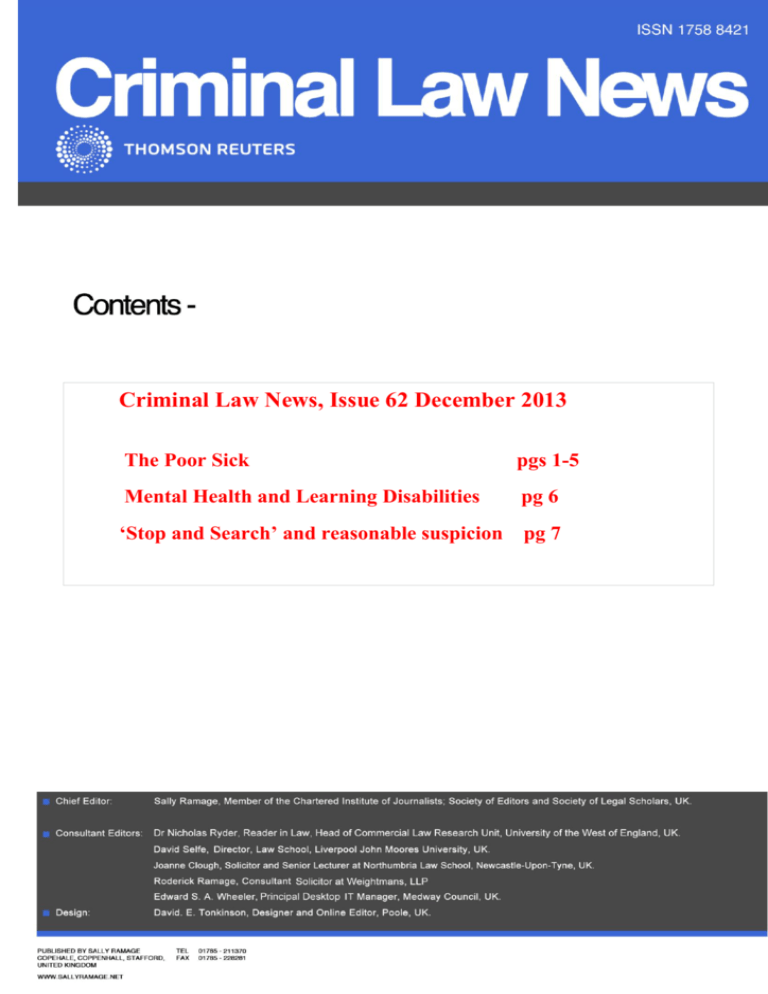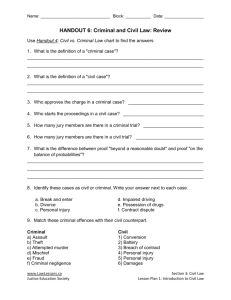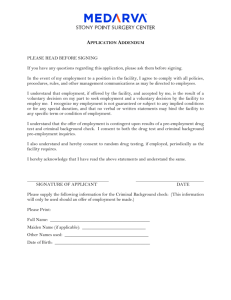
Criminal Law News, Issue 62 December 2013
The Poor Sick
pgs 1-5
Mental Health and Learning Disabilities
pg 6
‘Stop and Search’ and reasonable suspicion
pg 7
Criminal Law News
Issue 62- December-2013
ISSN 1758-8421
The Poor Sick
Sally Ramage
Poverty and sickness have always been close partners, each causing the
other. So attempts to relieve poverty have necessarily been associated
with care of the sick poor and more recently this care was in the hope of
restoring the working capacity of the individual. These two aspects of the
relief of poverty were intertwined in England up to 1930 and used to be
administered by Boards of Guardians under Poor Law powers.
Then the Local Government Act 1929 abolished the Guardians and
transferred their duties and possessions ·to the Councils of Counties and
County Boroughs. The other provisions of the Local Government Act
1929 had not been investigated but certain related matters were
considered insofar as they concern the sick poor. In this study, Dr
Ramage made references to the relations with Voluntary Hospitals and to
the financial effects of the Act.
Development of the Poor Law and Public Health Medical Services
Until their closure in 1536 and 1539, the treatment of the sick and
particularly the sick poor, was in the hands of the Monasteries. By
2
Criminal Law News
Issue 62- December-2013
ISSN 1758-8421
the 1535 the individual Parishes were made responsible for their
poor.
1601 Poor Law Act
The first mention of special institutional accommodation for the
Poor was made in the Poor Law Act of Elizabeth (1601). Overseers
were appointed to control the paupers and were empowered to build
convenient houses for the reception of the sick and impotent
amongst them.
1662 Settlement Act
In 1662 the Settlement Act was passed in Britain. This was
repressive and marked the beginning of a long period in which
every effort was made do diminish the numbers of persons seeking
assistance. Some provisions of the 1662 Settlement Act are still
operative.
1832 Poor Law Amendment Act
The cost of Poor Relief had risen so much that a Royal Commission
was appointed to investigate the problem in 1832 and then the Poor
Law Amendment Act of 1832 was passed. The 1832 Act
reorganised and reformed the Poor Law.
3
Criminal Law News
Issue 62- December-2013
ISSN 1758-8421
1847 Poor Law Board
A Central Authority was set up, named the Central Poor Law
Committee (which was replaced by a Poor Law Board in 1847).
Locally, new districts (Unions) were created, by combining parishes
on the grounds of greater economy, extended operations and better
classifications of paupers. Boards of Guardians replaced the former
Overseers and were responsible to the Central Authority.
The Guardians were encouraged to build institutions, albeit of a
‘deterrent type’, and already doctors had been appointed to many of
the existing workhouses to attend the sick.
1831 Central Board of Health
Following the investigation of an outbreak of cholera in 1831, a
consultative central Board of Health was established under the Privy
Council. This Board recommended that local boards of health
should be formed to remedy obvious sanitary defects.
1846 Nuisance Removal Act
The Vaccination Act of 1841 conferred on the Guardians a primary
duty of prevention medicine and the Nuisances Removal Act 1846
imposed on them the duties of Sanitation, making them the rural
sanitary authorities. In 1838 the Poor Law Commissioners drew
4
Criminal Law News
Issue 62- December-2013
ISSN 1758-8421
attention to the charges on the poor rate, ‘which are caused by
nuisances by which contagion is generated and persons are reduced
to destitution’. It was urged that it was good economy for the
administrators of the poor.
5
Criminal Law News
Issue 62- December-2013
ISSN 1758-8421
Mental health and learning disabilities
In 2013, the Prison Reform Trust and Rethink Mental Illness issued advice on mental
health and learning disabilities in the criminal courts. Defence lawyers do represent
clients with mental health conditions and learning disabilities, but recognising when
individuals have these conditions and knowing how best to respond can be difficult.
In 2009, Lord Bradley's review of people with mental health problems or learning
disabilities in the criminal justice system recommended awareness training for all
professionals involved in the criminal justice process. A new resource has been
published which contains information useful for defence solicitors. The resource
covers topics such as how to recognise when a client might have a mental health
condition or a learning disability; disabilities and impairments such as autism, specific
learning difficulties, and communication difficulties; the implications of these
conditions for defendants; how to support vulnerable defendants in court; bail and
remand decisions; sentencing options, and the Mental Health Act.
6
Criminal Law News
Issue 62- December-2013
ISSN 1758-8421
Criminal Procedure Rules 2013(CPR)
The Court of Appeal in R v K,1 paragraph 6 underlined the importance of the Criminal
Procedure Rules 2013, making it clear that the rules:
'[I]mpose duties and burdens on all the participants in a criminal trial,
including the judge, and the preparation and conduct of criminal trials
is dependent on, and subject to, these rules...'
According to Thomas LJ in R (on the application of the DPP) v Chorley Justices2 the
introduction of the CPR has 'effected a sea change in the way in which cases should
be conducted'.
The rules define the full extent of the duties imposed by the CPR.
The nature of those obligations was described by the House of Lords in Arthur J.S.
Hall and Co. v Simons (AP)3 at 715:
'..[I]t is necessary to appreciate the extent of that duty and the extent to
which the efficiency of our systems of criminal justice depends on it.
The advocate's duty to the court is not just that he must not mislead the
court, that he must ensure that the facts are presented fairly and that
1
[2006] EWCA Crim 724, [2006] 2 All E.R. 552.
[2006] EWHC 1795.
3
[ 2000] UKHL 38, [2002] 1 AC 615.
2
7
Criminal Law News
Issue 62- December-2013
ISSN 1758-8421
he must draw the attention of the court to the relevant authorities even
if they are against him. It extends to the whole way in which the client's
case is presented, so that time is not wasted and the court is able to
focus on the issues as efficiently and economically as possible.
Printed and published by Sally Ramage®
, Copehale, Coppenhall,
Stafford, ST18 9BW, UK. Registered as a Newspaper at the Post Office. © Sally
Ramage® 2013. All Rights Reserved. No part of this publication may be reproduced
in any material form (including photocopying or storing it in any medium by
electronic means and whether or not transiently or incidentally to some others use of
this publication) without the written permission of the copyright holder except in
accordance with the provisions of the Copyright, Design and Patents Act 1988 or
under the terms of a licence issued by the Copyright Licensing Agency, Saffron
House, 6-10 Kirby Street, London, England EC1N 8TS. Application for the copyright
owner’s written permission to reproduce any part of this publication should be
addressed to the publisher. Warning: the doing of an unauthorised act in relation to a
copyright work may result in both a civil claim for damages and criminal prosecution.
ISSN1758-8421.
8








